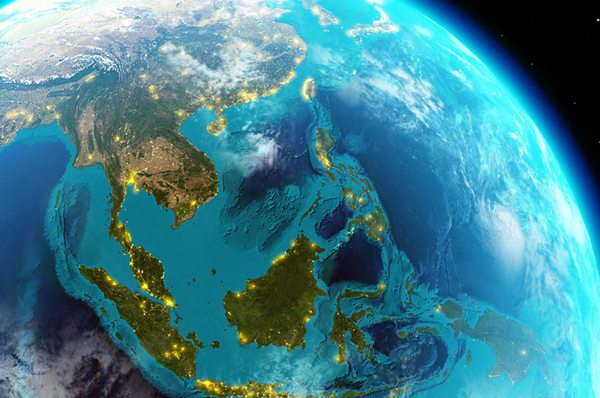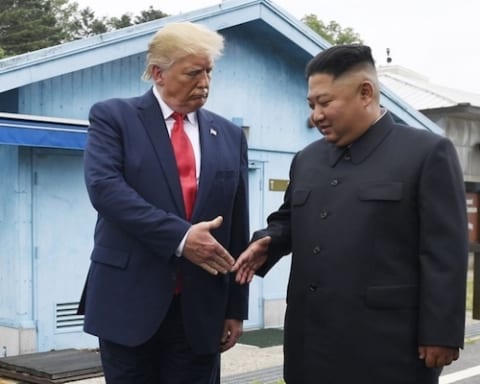29th of August – Lima Charlie’s South East Asia Week-in-Review News Briefing
Preparations for the festival of Eid al-Adha are underway in Bangladesh.
#Bangladesh
عيد مبارك
On September 12th, Muslims in Bangladesh and worldwide will be celebrating Eid al-Adha, also known as the Sacrifice Feast. Eid-al-Adha honors the willingness of Abraham to sacrifice his son in an act of submission to God. Even before Abraham officially makes the sacrifice, however, the angel Gabriel is sent by God to intervene, informing Abraham that God has sacrificed a lamb instead.
This year, millions of Bangladeshis are expected to travel home to see friends and relatives, during the celebration, causing major delays to an already overexerted public transportation system. To ease overcrowding at railroad stations, Railway Minister Mazibul Hoque announced advanced ticket sales starting on August 29th. Mr. Hoque said, “People will be able to purchase the tickets from 8am at the ticket counters and online. There is a maximum limit of four tickets per person and they are all nonrefundable.” In an effort to further ease the congestion, Mr Hoque said, “We will operate seven special trains during Eid.” It is estimated that the railway will carry around 260,000 passengers per day during the holiday.
#Myanmar
Last Sunday, Aung San Suu Kyi, State Counsellor of Myanmar, completed her five-day office State visit to China, where she held talks with Premier Li Keqiang, Chairman Zhang, and President Xi Jinping. The trip was Suu Kyi’s third state visit abroad and arguably her most important one since coming to power on April 1st of this year. The visit served as a chance for the ruling communists to court Myanmar’s new de-facto leader. Although no major agreements were signed, both sides affirmed their commitment to goodwill and to “strengthening their bilateral relations for the mutual benefit and development in both countries.” Both sides also agreed to “enhance trade, economic cooperation, and various forms of friendly exchanges that would contribute to the well-being of the peoples.”
However, the most interesting development to come out of the meeting was China’s change in tactics towards Myanmar. China announced plans to move from a close relationship with the Army to cuddling up to Suu Kyi and her National League for Democracy Party. It is quite well known that Myanmar is starved for foreign investment and sees Chinese investment as an opportunity to develop the nation. But it seems that people have underestimated China’s need for Myanmar. In fact, some could argue that China’s need for Myanmar is greater than Myanmar’s need for China. Myanmar is rich in natural resources, especially oil, copper, timber, and rare earth metals, all of which China needs to feed its manufacturing and energy sectors. China isn’t as resource rich as its neighbor and, with a population over 1.3 billion, its need for oil, gas and electricity grows every day.
There is also the strategic importance that Myanmar presents. If China wins its bid to build a Special Economic Zone (SEZ) in Kyaukphyu, Rakihin State—which possesses a deep water port, gas pipeline and possible railway links—China will have a port from which it can bypass the Strait of Malacca, one of the busiest shipping lanes in the world. China is, thus, pushing hard for the Bangladesh-China-India-Myanmar (BCIM) Economic Corridor. This will give China greater control of resources flowing into the country and more control of its economic output. Furthermore, it will help China transform its Navy into a Blue Water Navy with a string of friendly ports.
As a result, China’s support for Myanmar’s peace efforts is key to China’s global ambitions. China realizes that supporting rebel groups along Myanmar’s northern border, which it once used as leverage over the former military government, is a losing cause. Getting tougher with these groups and cleaning up the border would allow for more trade to flow between the two nations and to win favor with the new government as it reins in Ethnic Armed Groups like the United Wa State Army, Myanmar National Democratic Alliance Army, and National Democratic Alliance Army.
It will be very interesting to see the role China will play in the Union Peace Conference on August 31st. The goal of the conference is to end over 68 years of civil conflict and promote national reconciliation. It will also be interesting to see how Suu Kyi will reward China for its efforts in facilitating peace as the nation tries to end almost three quarters of a century of civil conflict. Myanmar has already reaffirmed two key political and economic initiatives, the first being support for the one-China policy and, the second, China’s “Belt and Road” initiative coupled with the BCIM. We will have to wait until after the conference to truly know the full scope of Aung San Suu Kyi’s State Visit to China, when China makes good on its promise to continue supporting political dialogue for national reconciliation and peace in Myanmar.
In other news, United Nations Secretary-General Ban Ki-moon has been invited to attend the 21st Century Panglong Peace Conference scheduled for next week. If Ban attends, it will be a big boost to the peace process by demonstrating to all stakeholders involved that the world is behind the nation of Myanmar’s efforts for peace. However, while all stakeholders are getting ready for the conference, new clashes have broken out in Kachin State between the Kachin Independence Army and the Burmese Army. It was reported that the Burmese Army used two helicopters to attack a KIA base near Ja Htar village. There were also reports of fighting between KIA Battalion No. 6 and the Burmese military in Hpakant Township in Kachin State. So far, no causalities have been reported.
Lima Charlie will be covering the 21st Century Panglong Conference, which will take place in Myanmar’s capital city, Naypyidaw, from August 31 to September 5. Stay tuned for our on-the-ground reporting on the event, the first major peace conference held in Myanmar since Aung San Suu Kyi’s National League for Democracy came to power in late March of 2016.
#Thailand
On Tuesday night, Thailand’s deep South was hit yet again by another wave of bombings. This time, the beach resort town of Pattani was the target. This new round of attacks comes just weeks after the deadly Mother’s Day bomb and arson attacks. The first of last week’s three explosions went off in a parking lot behind the Southern Hotel. Pattani’s Police Lieutenant Colonel also announced, “The second explosion came from a truck parked at the hotel entrance, opposite a karaoke bar and a massage parlor, resulting in one death and 30 injuries.” Just like the previous bombing, no one has claimed responsibility, but this time all casualties were Thai nationals.
This new wave of violence comes just a week before the scheduled peace negotiations between the Barisan Revolusi Nasional, the Mara Patani group, and the government. Meanwhile, Thai authorities have continued their investigation into the deadly wave of Mother’s Day bombings and arson attacks that rocked Southern Thailand almost two weeks ago. Although no one has claimed responsibility for these attacks, Thai Authorities still have not ruled out the involvement of disgruntled political parties, due to the constitutional referendum. They have also not ruled out Malay-Muslim insurgents looking to escalate the violence in the region. Despite the lack of definite culpability, the authorities seem to be focusing on 20 suspects whom they believe are Muslims from Southern Thailand. On Monday, the Surat Thani Police offered a 100,000 baht reward for any information on four suspects who they believe are responsible for the attacks.
The local Police Chief General has informed the public that the police now know the meeting points and travel routes of all the suspects before and after their bombing missions. Pol Gen. Chakthip Chaijinda said:
“The incident appears to be the work of the new generation, as we have had no profiles of several of them. The veterans may have played a supportive role. This makes the investigation quite difficult…We believe all of them received training before carrying out the coordinated attacks. We know where they came from, where they went. We believe there are at least 20 people involved in this network.”
The Malay-Muslim insurgency between ethnic Malays who want greater autonomy and the Thai Government has claimed 6,500 lives since 2004. However, the unwillingness of the junta’s government to place blame on southern insurgents leads some to believe that the government is afraid to admit that the insurgency has spread, thereby damaging the tourist industry. It is estimated that Thailand’s tourist industry makes up around 16 to 20% of the country’s gross domestic product.
In other news, a military court in Thailand has postponed the court hearing for two ethnic Uighurs from China. The decision comes in the wake of the assigned court interpreter jumping bail on drug charges. The two defendants have been accused in connection with the Erawan Shrine Bombing that took place a year ago. The bombing killed 20 people and injured 125.
#Philippines
Philippine President Rodrigo Duterte’s war on drugs has reached new heights, with the current number of drug-related killings totaling 1,800. This new figure has not only drawn criticism from the United Nations and human rights groups, but it has also caused outrage amongst politicians. Frustrated by U.N criticism over the war on drugs, Mr. Duterte lashed out at the U.N. at a late-night news conference on Sunday, announcing that the Philippines might leave the United Nations and inviting China and others to form a new global forum, accusing the UN of failing to fulfill its mandate.
Duterte’s words, however, seem to be a hollow threat, as the Philippines and China are still embroiled in a row over the Permanent Court of Arbitration’s unanimous decision at the Hague. The ruling affirmed that China has “no legal basis” to its claims in the South China Sea. Duterte’s Foreign Minister, Perfecto Yasay, later released a statement backtracking on the President’s comments. “We are committed to the U.N., despite our numerous frustrations and disappointments with the international agency,” he announced. He also informed reporters that Duterte will uphold his promise to protect human rights in the fight against drugs and has ordered the police to investigate and prosecute offenders. He criticized the U.N. reporters for “jumping to an arbitrary conclusion that we have violated human rights of people.”
On Monday, a two-day Senate Committee inquiry on alleged extrajudicial killings began. The Philippines National Police Chief and Commission on Human Rights Chairman listened to testimony delivered by witnesses who claimed the police had murdered their family members as a result of Duterte’s war on drugs. Senator Leila de Lima, Human Rights Chairman, expressed, “I am disturbed that we have killings left and right at breakfast every morning. “My concern does not only revolve around the growing tally of killings reported by the police. What is particularly worrisome is that the campaign against drugs seems to be an excuse for some law enforcers and other elements like vigilantes to commit murder with impunity.” To substantiate her allegations, she produced witnesses who recounted their own experiences of police torturing and killing family members.
One such story comes from a 26-year-old witness, Harra Kazuo, whose common-law husband JP Bertes and his father Renato Bertes were allegedly taken from their house in Pasay City on July 6 by local policemen and fatally shot in a police station the following day. Mrs. Kazuo’s story, however, is sadly not unique, as the number of killings stemming from the war on drugs seems to clime unabated. According to the testimony of the Philippine National Police Chief, 712 drug traffickers and users have been killed in police operations since July 1. However, the PNP also recorded 1,067 killed “outside police operations” or apparently by vigilantes.
While the Senate inquiry continues, jails and rehabilitation centers across the Philippines are overflowing with thousands of drug users who are surrendering to authorities in fear of their lives. A recent CNN report noted that the Quezon City Jail, which was built to house 800 inmates, is now housing over 4,000 inmates. Cells that were designed to hold 30 are crammed with 131. To make things worse, 60% of the current population is imprisoned for drug-related offenses, with drug possession prevalent inside the prison’s walls. And yet, despite the criticism from politicians at home and abroad, Duterte’s approval ratings have reached 91%.
#Singapore
On Monday, Former President Sellapan Ramanathan Nathan, Singapore’s longest-serving President, passed away at age 92.
The son of Indian Tamil immigrants, S R Nathan was born in Singapore on July 3, 1924. During the Great Depression, his family fell on hard times and Nathan was forced to work while attending school, to support them. During the Japanese occupation, Nathan worked as a translator for the Japanese Civilian Police Force. After the war, he finally completed his secondary education and entered the University of Malaya, where he graduated in 1954. His career as a civil servant graces over six decades, from his service as a Seamen’s Welfare Officer to his rise to the Presidency in 1999.
Current Prime Minister Lee expressed his thoughts in a condolence letter, noting, “Mr Nathan always put his nation before self, often at great personal sacrifice.” He praised Nathan’s “savvy judgment and moral courage” and “instrumental role in preventing the Communists from taking over Singapore.” Lee also spoke to Nathan’s work in diplomacy at the Ministry of Foreign Affairs. But perhaps, there is no better example of Mr. Nathan’s courage and selfless devotion to Singapore than during the “Laju incident” on January 31, 1974. Nathan put his life on the line for his fellow countrymen when members of the terrorist group, the Japanese Red Army, bombed petroleum tanks off the coast of Singapore. Nathan agreed to be taken as a volunteer hostage by the JRA to secure the release of civilian hostages.
He worked tirelessly, representing the multi-ethnic nation of Singapore and was the only Singaporean President to serve two terms as President.
State Funeral Services for former President S R Nathan will be held on Friday.
+++ End
For up-to-date news about South East Asia, please join us on Twitter at @LimaCharlieNews
Lima Charlie provides global news, insight and analysis by military veterans and service members Worldwide.
#ASEANNews #ASEAN #LimaCharlie #LimaCharlieNews



![Image Memorial Day may soon be a remembrance of democracy and those who had the courage to defend it [Lima Charlie News]](https://limacharlienews.com/wp-content/uploads/2018/05/Memorial-Day-may-soon-be-a-remembrance-of-democracy-and-those-who-had-the-courage-to-defend-it-Lima-Charlie-News-480x384.png)
![A Trump war crime pardon dishonors us all [Lima Charlie News]](https://limacharlienews.com/wp-content/uploads/2019/05/A-Trump-war-crime-pardon-dishonors-us-all-Lima-Charlie-News-480x384.png)

![Blossoming Russo-Turkish alliance leaves U.S., NATO behind [Lima Charlie News]](https://limacharlienews.com/wp-content/uploads/2019/07/Russia-Turkey-alliance-leaves-U.S.-NATO-behind-480x384.png)



![Image Memorial Day may soon be a remembrance of democracy and those who had the courage to defend it [Lima Charlie News]](https://limacharlienews.com/wp-content/uploads/2018/05/Memorial-Day-may-soon-be-a-remembrance-of-democracy-and-those-who-had-the-courage-to-defend-it-Lima-Charlie-News-150x100.png)